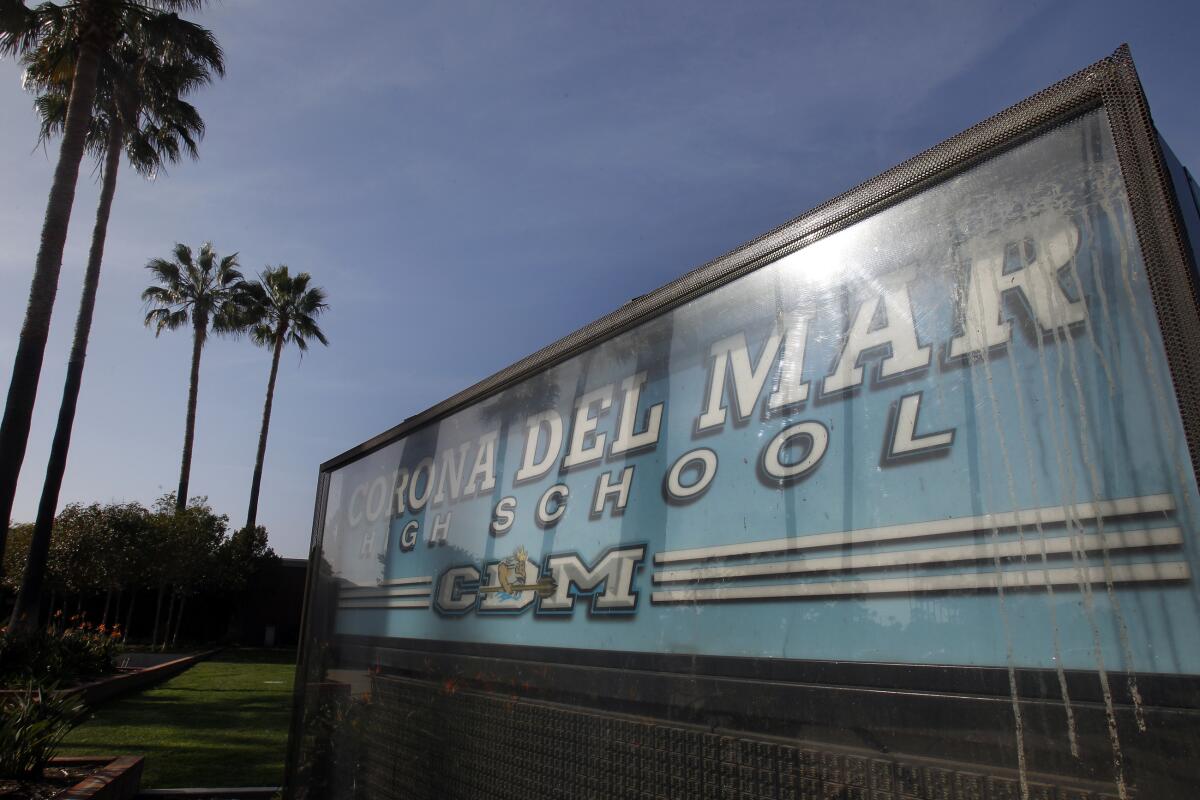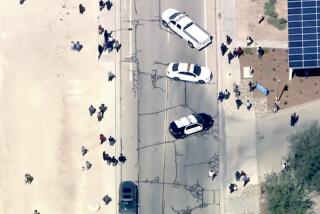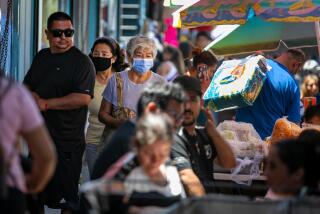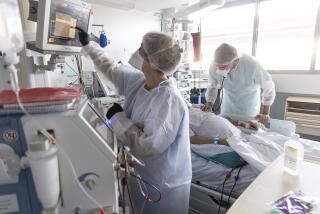Coronavirus fears prompt hoaxes and misinformation

Residents of an off-campus housing complex near USC got a scare Monday night in the form of an email.
The message from the manager of the Lorenzo apartments stated that a tenant had contracted the new strain of coronavirus that’s caused 304 deaths in China.
A unit on the seventh floor of the building was cordoned off with caution tape, and someone was loaded into an ambulance outside, said Frank Zhu, 20, a USC sophomore who lives at the complex.
“There was a total panic going on,” Zhu said. “Everybody was trying to go out and get face masks. I even texted my parents and asked them if I should come home.”
The report spread rapidly via social media.
Within two hours, USC sent out a schoolwide emergency alert. The report was not true. Officials reassured the student body that no one in the USC community had been diagnosed with or evaluated for coronavirus. “Students can be transported by ambulance for a variety of health conditions,” the message noted. The Lorenzo building manager sent a second email to tenants saying the first report was false.
“That particular notification came really near the peak of what I would call the general concern and worry present not only at USC but the entire country,” Dr. Sarah Van Orman, chief health officer of USC Student Health, said of the initial email.
As fears over the new strain of coronavirus spread rapidly, so does misinformation. Multiple schools and universities, and even the city of Carson, have been forced to refute rumors and hoaxes that members of their communities have contracted the virus. Many of the false reports were spread through Facebook posts, Snapchat messages and tweets.
“There are certain things that lend themselves to this kind of contagion, and that includes fears about public health, where people tend to relay or share information before they’ve verified that it’s true because they feel there’s urgency around it,” said Gabriel Kahn, a professor at USC’s Annenberg School for Communication and Journalism.
“Ironically, speed is important on those things. But at the same time, those are the ones you have to be most certain about verifying before you share, and that goes against our instincts as human beings.”
It’s been about a week since the coronavirus reached Southern California, and it’s been at the top of local newscasts.
First there were the initial confirmed cases — one in Orange County and a second in Los Angeles County — announced last weekend. Then, U.S. government personnel in Wuhan were evacuated to March Air Reserve Base in Riverside County after fleeing the outbreak. The federal Centers for Disease Control and Prevention ordered a quarantine for all 195 of the evacuees Friday that will last 14 days from when the plane left China — the CDC’s first mandatory quarantine in more than 50 years.
Also on Friday, the Trump administration declared a public health emergency and announced it would temporarily bar foreign nationals who have traveled in China in the last two weeks from entering the country. And public health officials announced that a Santa Clara County man who had recently returned from Wuhan tested positive for the coronavirus, becoming the seventh case in the country and the third in the state. On Saturday, a Boston man in his 20s became the eighth confirmed U.S. case.
Amid the fast-paced developments, local schools and institutions have been scrambling to counter the rumors and allay fears with accurate information.
USC followed up its initial alert with several other messages answering frequently asked questions and held a Facebook live event to address students’ concerns.
“What we really want to try to do is not minimize it but help people put the risk of this in context, and I think that’s really helping,” Van Orman said.
After Orange County health officials announced Jan. 25 that a patient, described only as a man in his 50s, was found to have coronavirus, a rumor circulated online that he was the parent of an Irvine Valley College student.
“That social media report was generated fairly widely,” said Dr. Cindy Vyskocil, the college’s acting president. “It caused tremendous concern.”
The school immediately reached out to the Orange County Health Care Agency and on Monday notified students that there was no credible link to any college student or staffer.
Since then, the school has continued to contact health officials twice a day to learn the status of the county’s coronavirus case, and has been providing students with regular updates, Vyskocil said.
In addition to reassuring students that the virus does not currently pose a threat to the campus, the school has been sending notes about preventive measures to avoid passing along viruses.
“It’s kind of a fine line of having a measured response to make sure accurate information is out there, but also helping folks continue to be vigilant about proactive ways in which to prevent the spread of things like the cold or flu virus,” Vyskocil said.
Similar rumors have dogged UC Irvine; an online petition to shut down the campus because of coronavirus fears had amassed nearly 10,500 signatures as of Friday.
“With some of those rumors on social media and across multiple platforms and also in multiple languages, the misinformation has been spreading,” said Sherry Main, UC Irvine’s assistant vice chancellor of public affairs.
The school has created a podcast about coronavirus misconceptions that has played on local radio and also plans next week to launch an educational campaign featuring hand-washing stations on the campus’ main thoroughfare.
While some of the false reports about coronavirus diagnoses involved misinformation, others appeared to be deliberate hoaxes.
In at least two instances, images were edited to look like screenshots of news articles reporting that Southern California students had contracted the coronavirus.
The first was a bogus report made to resemble a Daily Pilot article stating that a student at Corona del Mar High School in Newport Beach had been “linked” to a coronavirus case.
Newport-Mesa Unified School District officials became aware of the item Wednesday morning. They quickly contacted the Daily Pilot to confirm that the article was fake, and then notified the school community in a statement, said Annette Franco, the district’s public relations officer.
“To be honest, I think we responded quickly enough where there wasn’t too much of a buzz, and I think a lot of people were smart enough to know that it wasn’t a real article,” Franco said.
It was one of two fake reports resembling news articles that made the rounds Wednesday . A second stated that a student at Segerstrom High School in Santa Ana had contracted the virus. By Wednesday afternoon, the Santa Ana Unified School District sent a message refuting the hoax via social media and email. They also sent out communications in English and Spanish to district schools, which printed them out and provided them to students to take home.
“We believe quick and timely information is the best way to ensure the public is informed of what’s true and what isn’t,” said Dr. Alfonso Jimenez, the district’s deputy superintendent for educational services.
In at least one case, a coronavirus hoax is being handled as a criminal matter.
The L.A. County Sheriff’s Department is investigating the origins of a falsified letter stating that an outbreak had been reported in Carson, Capt. Jason Skeen confirmed Thursday. The FBI also is assisting with the investigation.
The missive appeared to be on official letterhead bearing the seals of multiple agencies, including the U.S. Centers for Disease Control and Prevention and the L.A. County Department of Public Health, as well as the forged signature of the Department of Public Health’s environmental health director.
It stated that five patients had tested positive for the virus, listed five businesses in Carson that they had supposedly visited and told anyone who had been there to go to the hospital.
The businesses, which included China Bowl Express and Seafood City Supermarket, were in majority-Asian areas of Carson, Mayor Albert Robles said.
“I think it was an attempt by someone to exacerbate the worst fears that some people might have that are based in hatred and racism,” he said.
To compound the issue, Carson City Hall was closed Thursday in observance of Fred T. Korematsu Day, a relatively new municipal holiday commemorating the Japanese American whose court case over his refusal to be interned during World War II went to the U.S. Supreme Court.
“I happened to be at City Hall and I ran into at least 20 people who were asking about the letter,” Robles said. “And people were calling me and they were calling City Hall and because it was closed no one was answering the phone, so they were coming there. That kind of unfortunately exacerbated the situation.”
The public is advised to be cautious about coronavirus information circulated via social media, especially if it provides private information that identifies patients who have tested positive. Other telltale signs of forged communications include grammatical errors and rambling prose, said Dr. Barbara Ferrer, the L.A. County public health director, adding that updates will come from public health departments and the Centers for Disease Control and Prevention.
“To alarm people with false information, not only is it dangerous, but as in the case of whoever issued that letter, it’s also highly illegal,” Ferrer said.
More to Read
Start your day right
Sign up for Essential California for news, features and recommendations from the L.A. Times and beyond in your inbox six days a week.
You may occasionally receive promotional content from the Los Angeles Times.






